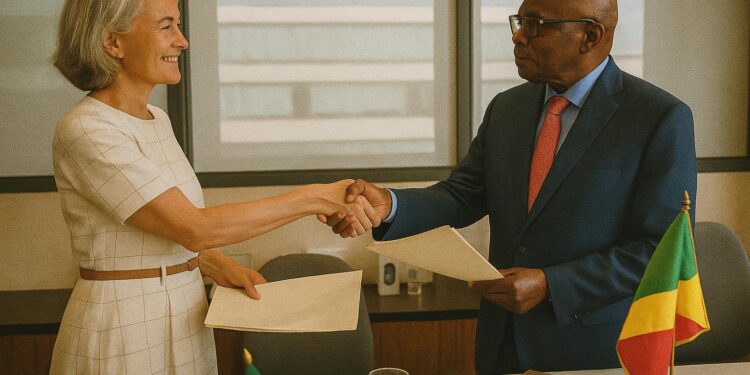A Quiet Signature with Loud Implications
In the austere marble corridors of Brazil’s Ministério da Fazenda, the 22 July signing ceremony lasted barely fifteen minutes, yet its geopolitical resonance may echo for years. Sônia de Almendra F. Portella Nunes, flanked by International Affairs Sub-Secretary Antonio Freitas, countersigned the first amendment to the 2014 Congo-Brazil debt rescheduling agreement. Ambassador Louis Sylvain-Goma, representing Brazzaville, described the act as “a technical step that nonetheless reaffirms a friendship cultivated over four decades.” Local media devoted sparse column inches to the event, a striking contrast to the cautious enthusiasm among diplomats who view it as a barometer of Congo’s broader strategy to stabilise its sovereign liabilities.
From LIBOR’s Swan Song to SOFR’s Debut
The amendment’s core is deceptively simple: the London Interbank Offered Rate, whose discontinuation in June 2023 closed a long era of dollar benchmark lending, is replaced by the Term Secured Overnight Financing Rate compiled by Bloomberg. Many emerging borrowers completed that technical migration months ago, yet the Congo-Brazil case bears unique symbolism. It evidences Brasília’s willingness to accompany African partners through the post-LIBOR transition rather than demanding an abrupt reset. Analysts at the Inter-American Development Bank note that South American lenders have adopted a “pragmatic patience” with counterparties adjusting their fiscal frameworks (IDB Research, 2024). For Brazzaville, the adoption of SOFR aligns its external debt servicing with market orthodoxy, insulating the treasury from benchmark volatility while improving transparency demanded by multilateral creditors.
Navigating Debt Dynamics amid Global Headwinds
Congo-Brazzaville’s public debt peaked at 110 percent of GDP in 2017, largely due to oil-price shocks and pandemic-era revenue losses, before retreating to an IMF-estimated 89 percent in 2023 (IMF Article IV Report, December 2023). The 2014 accord reprofiled roughly 365 million US dollars owed to Brazil’s National Treasury; today’s amendment refines its interest calculus but also paves the way for a second adjustment now before the Brazilian Senate that would compress amortisation and lighten short-term cash-flow pressures. São Paulo-based economist Helena de Moura argues the gesture “reinforces Brazil’s image as a constructive creditor at a moment when G20 discussions on low-income debt distress remain contentious.” In private, Congolese officials concede that favourable treatment from a G20 member could set a precedent for negotiations with non-Paris-Club lenders.
A Bilateral Relationship Forged in Continuity
Diplomatic ties between the two republics date back to 1980, nurtured by reciprocal embassies and punctuated by presidential visits—most recently President Denis Sassou Nguesso’s presence at the 2023 Amazon Cooperation Treaty Organization summit, where he underlined the Congo Basin’s ecological kinship with the Amazon. President Luiz Inácio Lula da Silva, recalling his 2007 stop in Brazzaville, publicly welcomed “a partner that speaks the same language of tropical forests and development.” Beyond high-level symbolism, technical cooperation has materialised in agriculture, civil construction and professional training programmes financed by the Brazilian Development Bank. The debt accord, therefore, is less an isolated fiscal tweak than a reaffirmation of an enduring South-South compact.
Prospects for a Renewed South-South Agenda
Looking ahead, both capitals are openly exploring the establishment of a bilateral investment fund centred on agribusiness value chains, according to senior officials in Brazzaville’s Ministry of Planning. Such an instrument could dovetail with Congo’s National Development Plan 2022-2026, which emphasises economic diversification beyond hydrocarbons, and with Brazil’s renewed diplomatic outreach to Africa, signalled by its bid to host the 2030 UN Climate Conference. Diplomats familiar with the file voice measured optimism: should the Senate endorse the second amendment trimming Congo’s debt service, financial space may emerge for joint green-bond issuances channelled toward reforestation corridors connecting the Amazon and the Congo Basin.
For now, the prosaic replacement of an obsolete benchmark has reminded observers that the mechanics of sovereign finance can either strain or strengthen political partnerships. By opting for the latter, Brasília and Brazzaville have chosen dialogue over docket, continuity over rupture. In an era of fractious multilateralism, such calibrated gestures—discreet, technical, yet firmly political—offer a quietly persuasive model of twenty-first-century diplomacy.












































